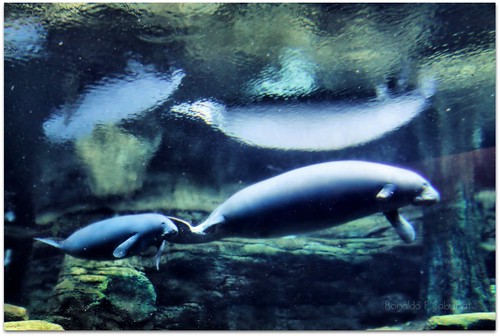

SAILORS of old sometimes mistook manatees for mermaids, which shows how months at sea quaffing rum and missing female company can cloud one's vision. Manatees (also called sea-cows) actually look like giant underwater slugs. Yet tourists love being kissed by them. A friendly manatee may swim right up and touch your face with his. Some people find this spiritually uplifting. Others merely think it fun to touch something so bulbous and endangered.
Either way, Crystal River, home of perhaps the world's largest herd of wild manatees, has long profited from hordes of holidaymakers flying thousands of miles to swim with them. But not this year, alas. "It's the holiday weekend and the boat is half-empty," grumbled Mike Birns, a guide for Sunshine River Tours, a small local operation, on the Thursday before July 4th.
Florida is reeling. Despite its many attractions, from riding the rollercoasters at Disney World to riding with the Bare Buns Bikers (a group of nude motorcycling enthusiasts), tourist arrivals in the first quarter fell by 10.6% from last year. In a global recession, dream vacations get deferred. Visitors are coming from closer by and spending less when they arrive.
Meanwhile, Florida's property bubble has popped violently. Empty condos blight the eastern seaboard. The median price of a home in Cape Coral-Fort Myers has fallen by two-thirds since 2006. Statewide unemployment, at 10.2%, has trebled since then, as bricklayers lay down their hods and tour guides doff their Mickey masks.
Florida's recession began earlier than the national one. Mark Wilson, the head of the Florida Chamber of Commerce, recalls sitting in an airport in 2007 reading an article in the Wall Street Journal headlined: "Is Florida Over?" It argued that Florida could no longer rely on migration to drive its economic growth. Mr Wilson agrees. "The Florida we've known for 30 years is gone," he says.
Florida's population has risen tenfold since the 1940s, to 18.3m. People visit, love the weather and stay. Native Floridians sell them houses, fix their teeth and pan-sear their scallops. The state even milks newcomers by charging them steeper property taxes. But when the influx slows--and Ohioans are finding it rather difficult to sell their houses just now--the Sunshine State's economy sputters.
Businesses are struggling to survive. Many, such as Sunshine River Tours, have cut their prices. Others are getting creative. The Sea School for merchant sailors in St Petersburg, for example, has boosted enrolment by offering a course in how to handle Somali pirates. Mr Wilson thinks Florida needs to shift from an economy based on tourism, construction and agriculture to one with more better-paid high-tech jobs. As a positive sign, he cites the opening of laboratories in Florida by three non-profit research organisations--though all three were lured with subsidies.
The dream of a high-tech Florida is not outlandish. NASA, which was due to launch another Space Shuttle this week, attracts rocket scientists. Florida's many retirees create a demand for hospitals, around which biomedical researchers cluster. The sun and fun that lure tourists also help high-tech firms woo talent, says Phil Holt of EA Tiburon, a video-game developer near Orlando. But other states have balmy weather, too. And Florida's education system leaves much to be desired, though an overhaul is in progress.
Florida's state government is business-friendly, but not uniformly so. Not much oil-drilling is allowed offshore. A referendum in 2010, dubbed the "Vote on Everything" initiative, would require popular votes on changes to local land-use plans. Businesses fret that this will lead to thousands of local referenda each year and make it dauntingly tough for anyone to build a new office, factory or theme park.
Another looming threat concerns the weather. Some of the nicest homes in Florida are periodically crushed by hurricanes. Two years ago, after homeowners complained about rising insurance premiums, the governor, Charlie Crist, leaned on firms to cut prices and offered Floridians state-subsidised policies. Private insurers curtailed their operations or pulled out. When the next hurricane hits, the repair bill will land squarely on Floridian taxpayers, rather than being spread among global insurers. It would be hard to devise a surer formula for economic catastrophe.
Source Citation
"Sorrow in the sunshine; Statewatch: Florida." The Economist [US] 11 July 2009: 43EU. Academic OneFile. Web. 3 Jan. 2010.
Gale Document Number:A203294216


No comments:
Post a Comment